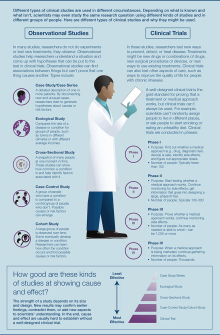Clinical Trials

We are uncovering better ways to treat, prevent, diagnose and understand pain and addiction
What are clinical trials?

Click image to enlarge in new window. (Courtesy of the National Institutes of Health)
Clinical trials can lead to medical advances by examining new ways to prevent, detect or treat diseases. They are an integral part of the clinical research process for a variety of potential health care solutions, including:
- Drug discovery for new medications or new combinations of medications.
- Development of new medical devices and technology, including smartphone apps.
- New uses for existing treatments.
- Behavioral changes that can be implemented to improve health.
- New ways to improve the quality of life for people with chronic pain and substance use disorders.
Clinical trials are used to determine if treatment, prevention and behavior approaches are safe and effective. When you volunteer to take part in clinical research, you help doctors and researchers learn more about disease and improve health care for people in the future.
To learn more about clinical trials, visit the National Institutes of Health's webpage, NIH Clinical Trials and You: The Basics.
Now recruiting:
The purpose of this study is to learn about how we can help and support women with opioid addiction (also called opioid use disorder) before and after they have a baby. More specifically, we will be exploring how social connection may be involved in opioid addiction during this time.
We are looking for women who:
- Have an opioid addiction or are currently in treatment for opioid addiction.
- Are currently pregnant or have recently had a baby.
- Are at least 18 years old.
Research volunteers will:
- Complete an anonymous 20-minute survey.
- Some participants will have the opportunity to complete additional surveys and interviews.
For more information, visit https://redcap.link/join_az_soar.
An Institutional Review Board responsible for human subjects research at The University of Arizona reviewed this research project and found it to be acceptable, according to applicable state and federal regulations and University policies designed to protect the rights and welfare of participants in research.
The purpose of the ROBIN Project is to explore relationships between hormones, infant caregiving activities and risk for opioid misuse after having a baby. We are looking for pregnant people who are between the ages of 18-40 and either have a history of opioid misuse or do not have that history to join our study.
While you are in this study, you will be asked to do the following:
- Participate in an assigned infant care activity (babywaring, skin-to-skin contact, or stroller walking) for three months after delivery
- Collect biological samples to measure hormones this includes your saliva and dried blood spots, and saliva from your baby
- Complete daily surveys to measure your mood, interactions with your baby, and substance use
- Meet with us in-person five times, including three times where we observe you participating in your assigned caregiving activity
- While you are in the study, we will communicate with you via phone, email, text messages or U.S. mail. We may use Google Voice to correspond with you.
For more information, visit https://redcap.link/robinproject.
An Institutional Review Board responsible for human subjects research at The University of Arizona reviewed this research project and found it to be acceptable, according to applicable state and federal regulations and University policies designed to protect the rights and welfare of participants in research.

